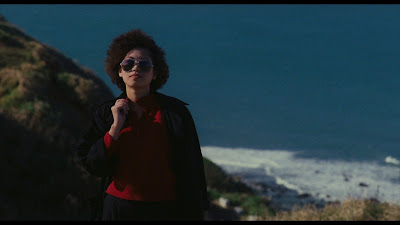Screens are from the superb, 2016 4K restoration
of Edward Yang's Taipei Story from
1985. The restoration was performed by the Film Foundation in association with
Cineteca Bologna and I understand had its premiere
at last year's Cinema Ritrovato. At least two other Yang pictures also have
undergone substantial restorations for Criterion Blu-ray in the last couple of
years, Yi Yi (2000) and A Brighter Summer Day (1991.) The 2016
restoration of Taipei Story has been
a long time coming for Yang's fans but the wait was well worth it after decades
of poor quality dupes and inferior TV broadcasts..
While the first two aforementioned Yangs have been
released in Criterion's main Blu-ray line, Taipei
is part of the label's ongoing World CInema multi-disc boxset series curated
and with intros by Scorsese, from Film Foundation. Taipei Story Blu-ray was
released this year in Volume 2 of the series and includes the 1965 Turkish film
Lutfi Akad's Law of the Border with
Yilmaz Guney, a seminal Turkish picture long thought missing and finally
rescued from a dupe 35mm print and 16mm backups . Other titles in the set:
Mario Peixoto's Limite (1931), Lino
Brocka's Insiang (1976), Weerasathakul's
Mysterious Object at Noon (2000) and
Ermek Shimabaev's Revenge (1989). All
I can say is rush out there and buy this. Everything on it is essential.
 |
| Hou Hsiao-hsien, Taipei Story |
But most essential to me was Yang's second feature,
and the first (to my knowledge) appearance of his friend Hou Hsaio-hsien, later
to become perhaps the most eminent current Taiwanese director, as the male
lead. Hou was also a co-writer of the screeenplay. I wish he'd done more movies
as an actor, he reminds me in many ways, physically especially of Fassbinder in
his own performances. (I keep imagining him doing his own nude scenes.)
Yang's film is the most astute and the first
recognizable salute to Antonioni by a major new director in what would later
become post Antonioni cinema (MA left us in 2007.). In the year the master died
Nuri Bilge Ceylan also adopted the Antonioni mantle in his second film ClImates (2007) delivering a comparable
influence and a seamless assimilation of tone. These two directors seem to be
the only artists who have done so in a way that amplifies their individual
concerns and styles.
 |
| Tsai Chin, Taipei Story |
Thus Taipei
Story opens with a girl, Chin wandering into an empty apartment to inspect
for rent, then a boy, Hou ("Lung' in the movie). The figures part and
barely look at each other, chat idly and meaninglessly and for the first of
many times in the movie Chin "arrives"at the centre of the frame and
looks out directly to the camera to close the opening sequence. Yang has taken
the end of Antonioni's masterpiece L'Eclisse
as the starting point for his "new cinema" of the same empty spaces
and environments that MA montages in that film, but he now returns characters
to these empty spaces as the new world of Taipei is undergoing its by now god
knows how many umpteenth metamorphoses into a constantly "renewing"
city that keeps leaving its inhabitants behind, lost, adrift.
The genius of Yang's film in
particular is both the specificity of its protagonists' estrangement from their
earlier world, which is concomitantly even more profoundly universal, and at
heart the disease of our age, existential and physical. For years, like most
everyone, I would try to wrestle with the movie in a rough, blurry ex VHS from
Brit TV but the sheer fogginess and weak detail of the lousy limage was a real barrier
to its meanings, to say nothing of its considerable formal beauty. I feel
ashamed to admit but I had not been looking closely at these Criterion Film
Foundation Boxsets until the Yang this year impelled me to break out of my lazy
comfort zone. At the moment these boxsets are selling at under $US80 and I
cannot recommend them highly enough.

No comments:
Post a Comment
Note: only a member of this blog may post a comment.